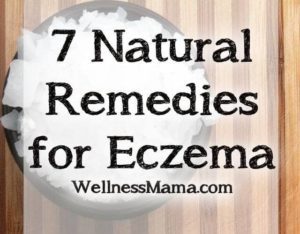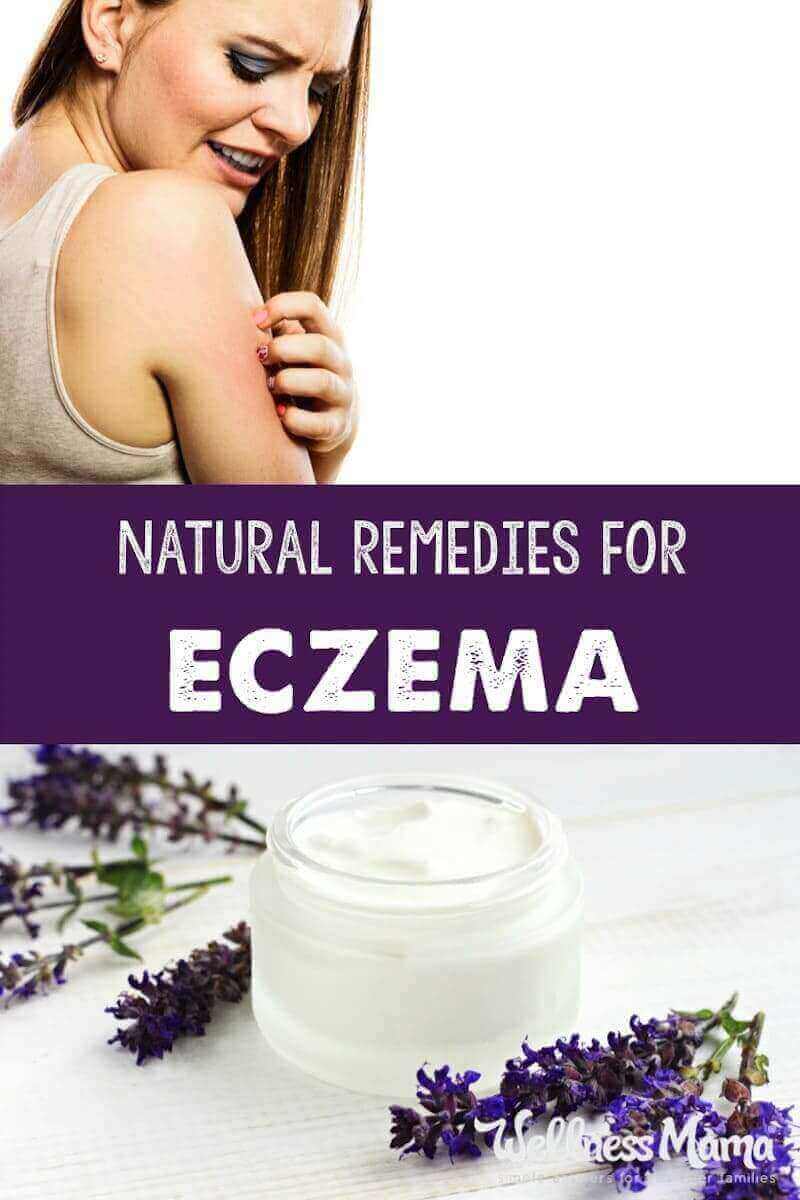I get quite a few questions about skin problems like eczema and psoriasis. I’m not a dermatologist by any means, but I have had some personal experience with eczema (in myself and my family) and have found some natural remedies that have helped us so I wanted to share. As always, ask your own doc and specialists before trying anything!
The Diet Connection With Eczema
I feel it is important to note that all of the topical remedies in the world didn’t help us until we addressed the underlying problem, in our case: diet and lifestyle factors that were causing/contributing to eczema.
Just as you can’t out supplement a bad diet in other areas, topical remedies don’t address the underlying problem.
Certainly, eczema and other skin issues are complex conditions with a potential variety of causes, but there do seem to be some common things that help (both dietary and other).
My Son’s Eczema (& What We Tried)
In our family, our son struggled with eczema off and on for a long time. He was born via c-section (due to placenta previa) and was given antibiotics and steroids as soon as he was born. This led to problems with his gut bacteria, some learning delays, and some skin/digestive problems.
We started the GAPS program (find all the details here) combined with a pretty intensive supplement and lifestyle change for him and finally started to see improvement.
If you haven’t heard of it, GAPS is an intensive diet that focuses on gut-healing foods like bone broth (traditionally prepared and long-simmered so it’s gelatin-rich) and many healthy fats and nutrient sources we typically don’t get enough of in our modern diets. It also includes a fair amount of fermented vegetables, making their nutrients more accessible to those with impaired digestive systems and helping the overall healing process.
How to Try a GAPS Diet
Depending on the severity of the patient, one either begins with or works up to the Introduction Diet, which is the strictest part of the protocol, focused on intensive healing. There are then stages as the person begins to introduce other foods. The most difficult factor of the GAPS diet is that in order to be effective, especially in the beginning, one must be 100% compliant. This means a lot of preparing foods at home, as practically any foods prepared by someone not familiar with the protocol will have things that can aggravate the gut.
For us, it meant consuming more homemade broth and soups (or ones from a quality source) as well as removing certain foods including gluten and casein (wheat and dairy). We also found that it was helpful to avoid food dyes and any processed ingredients, though this was as much from a behavior perspective as a skin one.
If you or a family member struggle with skin problems, allergies or behavior struggles, I’d definitely recommend at least checking out the book Gut and Psychology Syndrome to see if the protocol would be helpful for you.
Natural Remedies for Eczema
Of course, once diet has been addressed, there are some things that can be used topically that may speed healing or limit discomfort during the healing time. For us, these things were helpful:
1. Coconut Oil

We use coconut oil for skin, hair, teeth, and even soap making at our house! It is also great for eczema (as long as the person isn’t allergic/intolerant… I found this out the hard way when I took this genetic test and found out I don’t tolerate it well as a food.)
I’ve found that a thin layer of coconut oil or a coconut oil lotion bar helps cool eczema itching and pain.
For those sensitive to coconut oil, these hypoallergenic lotion bars work really well too.
2. Sea Salt Magnesium Spray
For eczema that is wet/oozing, I’ve found that drying it works better than trying to moisturize it. I’ve often heard people with skin problems say that they felt better at the beach, and it makes sense between the vitamin D from the sun and the magnesium and the minerals in the salt water.
For those who don’t live near the ocean, this homemade magnesium salt spray can help achieve some of the same benefits at home.
3. Omega-3 Oils (While Limiting Omega-6)
This natural eczema remedy may not provide immediate relief but may help get at the root cause. Certain research as recently as 2016 found that consuming high levels of omega-3 (that is, more than you would get from occasionally eating fish), especially at an early age may reduce the risk and severity of eczema. This is due to the DHA and EPA fatty acids found in fish.
While some studies suggest that more research is needed to pinpoint the degree of effectiveness, it seems that avoiding inflammatory omega-6 oils (found in many processed foods and vegetable oils) while increasing omega-3 sources from fish oil and consumption of fish had a positive effect on eczema in the studies listed below.
Unfortunately, studies suggest eating fish alone probably isn’t enough to get therapeutic benefits (though we do incorporate low-mercury seafood often). I find I get the most benefit when I take a fish oil supplement. I get the most benefit from these capsules due to the quality and ratio of omega-3 to omega-6. This company makes a chewable supplement for kids as well.
4. Magnesium Baths
For some people with eczema, soaking in water makes it worse. For those who tolerate it, magnesium baths and other types of detox baths can be helpful in skin healing.
I regularly add a cup of Epsom salts or magnesium flakes and a few tablespoons of Himalayan salt to my kids’ baths. When I have the time, I take relaxing baths in this mixture also.
When I can’t take the time for a bath, magnesium oil also helps. Amazingly, I notice the benefits of transdermal magnesium on the skin much more quickly than when I take internal forms of magnesium.
My favorite magnesium bath recipe is:
- 1-2 cups of Epsom salts or magnesium flakes (magnesium flakes are absorbed much more easily)
- 1/2 cup Himalayan or sea salt
- 1/2 tsp of natural vanilla extract
- 10-15 drops of essential oil of choice (I love lavender and mint)
These three detox bath recipes are also all great if the person can handle warm water.
5. Probiotics
Research on whether probiotics help eczema is mixed. A 2018 review found probiotics had “little to no effect” on eczema symptoms, although no adverse effects were noted either. This article at NationalEczema.org reviews many of the existing studies and concludes that “probiotics are not effective for the treatment of established atopic dermatitis but may be helpful in prevention.” It also points out that the current body of research may not be conclusive since the type of probiotic strain seems to matter greatly.
I know that probiotics seemed to help my son (high quality probiotics are an important part of the GAPS diet). I’m also constantly seeing more research on the many ways that gut bacteria influence our health, and I can’t believe that skin health is any exception. Could there be a link?
Probiotics and probiotic-rich foods are an element that is increasingly missing in the modern diet as we moved away from traditional food preparations like fermentation. (Find out how to bring back those methods here.) We also make an effort to wash our hands and our food (a good thing with the chemicals on them these days) which also wash off the beneficial soil-borne micro-organisms that provide friendly bacteria to the gut.
I’ve also found that the probiotic strains in those foods were not enough for us. We all now take Probiotics and have seen dramatic improvements in skin and digestive health.
6. Gelatin-Rich Foods
I’ve mentioned that bone broth was an important part of a healing diet for us, and this was partially because of its high gelatin content. Gelatin helps soothe the gut and the collagen it contains is also great for hair, skin, and nail health.
To make broth, you basically save the carcass when you roast a chicken, duck, turkey, or goose and follow these steps. Ideally, the animal lived its life outdoors eating its natural food. This means you’re looking for bones from grass-fed cattle or bison, pastured poultry, or wild-caught fish. Since you’ll be extracting the minerals and drinking them in concentrated form, you want to make sure that the animal was as healthy as possible.
There are several places to find good bones for stock or tallow (rendered fat) from healthy animals:
- From a local butcher, especially one who butchers the whole animal
- From local farmers who raise grass-fed animals (ask around at your local farmer’s market)
- Order online from companies like Butcher Box or US Wellness Meats
- I use grass-fed tallow when cooking or in soaps. I get mine at a discount from Thrive Market.
For those who aren’t ready to jump into having a pot of boiling bones on the stove, there is now a great pre-made shelf-stable bone broth available and I always keep this stocked in my pantry.
I also use gelatin in recipes like:
I also stir powdered collagen into smoothies, since this form of gelatin doesn’t clump in cold water.
7. Homemade Healing Salve
For scars or blisters from eczema that take longer to heal, a homemade healing salve was helpful for us. Our son would get eczema on his face before we were able to heal his gut and we are still working on reversing the scars from that. One thing that is helping is this homemade healing salve.
My homemade healing salve (or “boo-boo lotion”, according to the kids) is helpful on eczema as well as: cuts, bruises, stings, poison ivy, and skin irritations. It also helps diaper rash and baby skin irritations- just don’t use with cloth diapers or line them first!
A Note About Infant Eczema
Eczema isn’t a problem just because it causes pain and itching. In babies, it can be a risk factor for other problems. I didn’t realize this when we were figuring out my son’s issues, but according to newer research babies with eczema have a 1 in 3 chance of developing a food allergy later in life. In fact, they are 11 times more likely to develop a peanut allergy by their first birthday compared to infants without eczema.
It’s also important to note that symptoms of eczema often occur earlier than a food allergy, furthering the importance of food allergy prevention for babies with eczema.
Due to this research and other landmark clinical trials such as the LEAP trial, the National Institutes of Health (NIH) and American Academy of Pediatrics (AAP) now recommend introducing allergenic foods early and often — specifically for infants with eczema — to reduce their risk of developing a food allergy. (I explain more in this post.)
Helpful Eczema Resources
I vividly remember how terrible it was to watch my son suffer through his eczema and I know the pain of not being able to take away the pain/itching a child experiences. The book The Eczema Cure is a very thorough resource and provides answers when it feels like you’ve tried everything else.
For more, don’t miss this podcast interview with Jennifer Fugo, an expert on all things eczema (both personally and professionally), this one with Dr. Nelli Gluzman, and Getting Rid of Eczema for Good With Dr. Ana-Maria Temple.
This article was medically reviewed by Dr. Scott Soerries, MD, Family Physician and Medical Director of SteadyMD. As always, this is not personal medical advice and we recommend that you talk with your doctor.
Have you ever struggled with eczema or skin problems? What helped you? Share below!





Leave a Reply